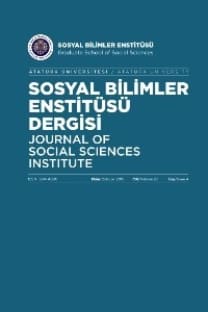Kuru Gürültü ’de Dramatik Dürtü Olarak Boynuzlanma Kavramı
Bu çalışmanın amacı Shakespeare’in Kuru Gürültü adlı oyununda boynuzlanma
kavramını incelemektir. Shakespeare, oyununda bu dramatik dürtüyü kullanarak 16. yüzyıl
toplumunun kadına karşı tutumunu gözler önüne sermektedir. Shakespeare’in zamanında
kadının onuru bekâretine ve erdemli davranışa dayanmaktadır. Kadın evlenmeden önce
ilişkiye girdiğinde, hem onurunu hem de toplumdaki yerini kaybeder. Oyun bu tutumu
ve 16. yüzyıl toplumunda erkeğin kadına karşı güvensizliğini, özellikle Claudio, Hero ve
Benedick-Beatrice arasındaki aşk ilişkilerini kullanarak sunmuştur. Erkeklerin hissettiği
endişe ve güvensizlik trajik olaylara sebep olduğu için oyunu problem bir oyun yapar.
Anahtar Kelimeler:
Boynuzlanma, kadın, problem oyun, Kuru Gürültü
This paper aims to examine the concept of cuckoldry in Shakespeare’s play Much Ado About Nothing. Shakespeare reveals the attitude of 16th-century society toward women by making use of this dramatic motive for the actions of male characters in his play. In Shakespeare’s time, women’s honor was based on their virginity and virtuous behavior. When a woman had a pre-martial sexual relationship with a man, she lost both her honor and her place in the society. This play presents this attitude and men’s mistrust of women in 16th-century society, particularly in the love affairs between Claudio and Hero, Benedic and Beatrice. The anxiety and mistrust the male characters felt in relation to women make it a problem play because they cause tragic events.
Keywords:
Cuckoldry, woman, problem play, Much Ado About Nothing,
___
Bevington, D. (2004). Intro. Much Ado About Nothing. By William Shakespeare. The Complete Works of Shakespeare. 5th ed. New York: Pearson Education, Inc.Cook, C. (1986). “The Sign and Semblance of Her Honor”: Reading Gender Differences in Much Ado About Nothing, PMLA. Vol. 101. 186-202.
Dod, J., Cleaver, R. (1614). A Godly Form of Household Government. Sig. A2. London.
Donlon, E. B. (2010). “No Ado About Something the Loss of Virginity.” Rev. of Much Ado about Nothing. Touchstone: A Journal of Mere Christianity Sept.-Oct. 1- http://www.search-document.com/pdf/8/9/much-ado.html
Dreher, D. E. (1986). Domination and Defiance: Fathers and Daughters in Shakespeare. Lexington, KY: The University Press of Kentucky.
The Holy Bible: King James Version (1611).
Kelso, R. (1956). Doctrine for the Lady for the Renaissance. Urbana: University of Illionis Press.
Klein, J. L. ed. (1992). Daughters Wives & Widows: Writings by Men about Women and Marriage in England, 1500-1640. Urbana: University of Illinois Press. Manis, J. (1999). Much Ado about Nothing by William Shakespeare. USA: Pennysylvania State University, http://www2.hn.psu.edu/faculty/jmanis/shakesp/ muchado.pdf.
Zomparelli, K. (2007). “Much Ado About Nothing’s Criticism of the Renaissance Patriarchy”. Honor Projects Paper I. http://digitalcommons.iwu.edu/eng_ honproj/I
- ISSN: 1304-4990
- Yayın Aralığı: Yılda 4 Sayı
- Yayıncı: Atatürk Üniversitesi Sosyal Bilimler Enstitüsü Müdürlüğü
Sayıdaki Diğer Makaleler
Bir Eleştirel Söylem Biçembilim Uygulaması: Adalet Ağaoğlu’nun “Karanfilsiz” Adlı Hikâyesi
Cuckoldry as a dramatic motive in Much Ado about Nothing
Yeni Ekonomik Coğrafya ve Teorik Modelleri
Emine Demet EKİNCİ, Ş. Mustafa ERSUNGUR
“A mosquito against an elephant” or individual struggle against the state’s reign of terror
Kuru Gürültü ’de Dramatik Dürtü Olarak Boynuzlanma Kavramı
Salvador Dali’nin takı çalışmaları
“Ölü” Adlı Fantastik Öykünün Çözümlenmesi
Selected index indicators in the accession of Turkey to the European Union
